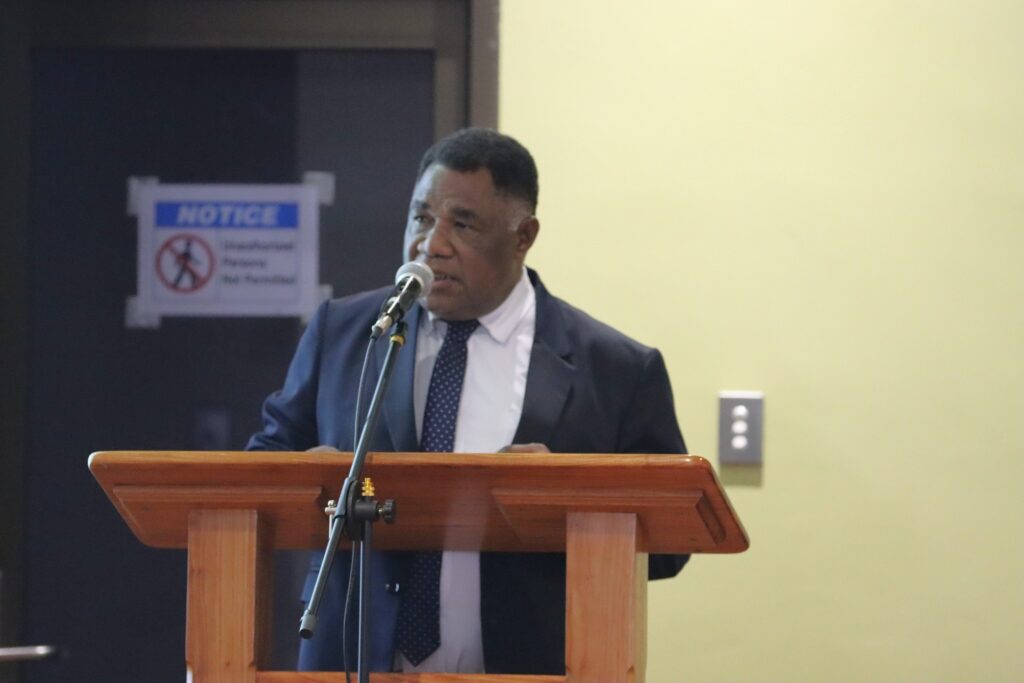Lae, Friday 11 April 2025 – Minister for Oil Palm, Hon. Francis Maneke, delivered a rousing address at the National Agriculture Industry Public-Private Sector Partnership Conference in Lae, asserting that Papua New Guinea’s economic future hinges on agriculture, and calling for immediate action to mobilise customary land, strengthen commodity boards, and implement long-overdue policies for the oil palm industry.
Speaking to a cross-section of senior government officials, governors, private sector leaders, international development partners, and rural producers, Minister Maneke made a compelling case that agriculture remains Papua New Guinea’s most viable and inclusive path to long-term economic growth, rural development, and poverty reduction.
“The way forward for our country is agriculture. Our economy will only be boosted when we emphasise and concentrate more on agriculture,” he said, adding that “no other sector has the reach and potential to touch the lives of rural people across every province.”
Commends Government’s Prioritisation of Key Commodities
Minister Maneke commended the Marape-Rosso Government for its recent decision to restructure oversight of critical commodities—coffee, oil palm, and livestock—by separating their management within government structures and giving them focused leadership.
“I thank Prime Minister Hon. James Marape for recognising the importance of these specific commodities and for appointing me Minister for Oil Palm. These are commodities that have immense potential for transformation and growth, especially in our rural areas,” he stated.
He said coffee, cocoa, coconut, livestock, and oil palm all need tailored support to thrive, with the potential to become major export revenue earners and employment generators if properly developed.

Oil Palm Industry: “No Policy, No Law, No Regulation – We Must Act Now”
A major part of the Minister’s address focused on the urgent need to bring the oil palm industry under proper policy and legal frameworks. He revealed that for the past eight years, the sector has been functioning without a national policy or any updated regulatory mechanism.
“Oil palm is the only commodity that has sustained itself since the 1960s, driven largely by the private sector. Yet, until now, it has not had a guiding policy or legislation. This is unacceptable if we are serious about growing the industry.”
He acknowledged the tireless efforts of companies such as New Britain Palm Oil Ltd, Hargy Oil Palms, and others that have continued to drive the industry despite the lack of institutional support, praising them for maintaining environmental and sustainability standards to access global markets.
He announced that under the Marape Government, a National Oil Palm Policy has now been completed and legislation to support it is in advanced stages of development. These frameworks will guide future expansion, investor partnerships, environmental certification, and land access.
Unlocking Customary Land: The Key to Agricultural Expansion
Minister Maneke stressed that land mobilisation remains the greatest obstacle to agricultural development in Papua New Guinea. With 97% of land under customary ownership, he said provincial governments must begin structured dialogues with landowners to unlock land for commercial agriculture.
“Development must be done with the consent and involvement of landowners. We must work with provincial governments and local leaders to make proper decisions on land release, especially in key oil palm target provinces such as Morobe, Madang, East and West Sepik, Central, Gulf, and Western.”
He proposed that Memoranda of Understanding (MOUs) be signed between the national government, provincial administrations, landowner groups, and the Department of Lands to coordinate access and development plans.
He also urged all stakeholders to ensure oil palm development adheres to environmental certification standards required by the European and Asian markets, as this is essential to secure premium pricing and market access.
Call for Infrastructure and Institutional Support
Recognising that infrastructure is a critical enabler for agricultural success, Minister Maneke appealed to the government to align road, bridge, and facility development with the growth of identified commodity value chains.
“If we want big impact, we must build the right roads, develop agro-research centres, and invest in proper buildings and services for each commodity. Agriculture cannot succeed without infrastructure.”
He praised the Government’s Connect PNG programme as a foundation for agricultural growth, but called for its stronger alignment with rural commodity development zones.
In addition, he said agriculture commodity boards must be adequately funded and empowered to carry out their mandates effectively.
“These boards are the technical arms of government. Without funding and support, they cannot perform. I urge the Prime Minister and the Government to back these institutions if we want to see results.”
A National Mission to Revive the Agriculture Sector
Minister Maneke concluded by reinforcing the need for partnerships across all levels of government and the private sector to drive PNG’s agricultural transformation.
He applauded the Department of Agriculture and Livestock, under the leadership of Secretary Dr Sergie Bang, for hosting the landmark conference and creating a space for honest dialogue and forward-looking resolutions.
“This forum must not just end with speeches. It must now lead to action. Let us turn these resolutions into real, visible outcomes for our farmers and rural communities,” he said.
“Only agriculture can lift our economy. Let us support our commodity boards, let us unlock our land, and let us give our rural people the tools to build their future.”
The National Agriculture Industry Public-Private Sector Partnership Conference concluded with a set of resolutions and recommendations, which will be presented to the National Executive Council for policy consideration and implementation planning.
###